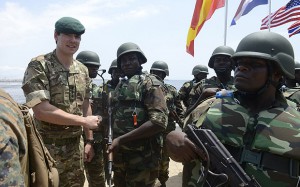The President of Nigeria, Muhammadu Buhari, addressed the European Parliament Wednesday during its plenary session in Strasbourg, and called for the European Union (EU) to increase the aid it provides in the fight against terrorism.
The President of the European Parliament Martin Schulz welcomed President Buhari, elected in May 2015, in praising the “very important reforms” he had initiated, “particularly in terms of the fight against terrorism when confronted with the unspeakable acts of the terrorist group Boko Haram.”
In a speech followed by long applause, President Buhari thanked the “many states of the European Union who have committed themselves in order to save the schoolgirls of Chibok,” of which the event, in April 2014, in the northeast of Nigeria, caused a wave of indignation around the world.
Regarding the fight against terrorism, “we are doing everything it is possible to do,” assured the Nigerian President to the Members of European Parliament (MEPs). “The ability for Boko Haram to launch major offensives has been geographically reduced,” he affirmed.
On January 30, at least 85 people were nevertheless killed in an attack that struck a locality nearby Maiduguri, in the northeast of Nigeria.
Since 2009, according to figures from the European Commission, the Islamist group Boko Haram has caused more than 20,000 deaths in Nigeria, with some 2.1 million people displaced by the violence in the country’s northeastern region. Boko Haram has also struck in neighboring countries, such as Cameroon, Chad and Niger.
Representatives of the international community, meeting at the seat of the African Union (AU) at Addis-Abeba, promised on Monday to devote 250 million dollars to finance the Multinational Joint Task Force (MNJTF) manned by 8,700 troops, police officers and civilians being set up to fight the Islamist movement.
“We are very alarmed by the situation in southern Libya where the arms market threatens all of Western Africa,” added President Buhari in warning, insisting on the “enormous financial and military commitments” consented to by his country in order to maintain peace.
The Nigerian President celebrated the agreement found at the La Valette summit, in Malta in November last year, which will provide 1.8 billion euros(1.97 billion U.S. dollars) in aid to the African Union from the EU. He assured MEPs of his support in the refugee crisis, but also stressed the necessity for a reinforced contribution from the EU and intensified cooperation in terms of development aid in order to fight against “problems linked to poverty, disease, and the lack of technology development.”
Nigeria, the leading economic power and leading producer of oil on the African continent, remains nevertheless largely dependent on its imports and has struggled under the steep fall in oil prices which have recorded a 60 percent drop since last year.
The Nigerian currency, the naira, has fallen. Investors believe that a devaluation of the currency is inevitable. President Buhari declared on January 28, however, that he had no intention to “kill” the naira.
xinhuanet.com



